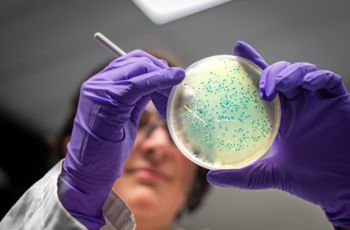The health care sector stands at the intersection of compassion, science, and business. Ensuring quality patient care while managing a complex organizational structure requires leaders who not only understand how the health care system works, but also have the necessary vision and management skills.
In today's forward-looking landscape, effective health care leadership requires embracing the Three C’s: Challenges, a Comprehensive understanding of systems, and Creative problem solving. The “Three C’s” are requirements for change-agents.
The George Washington University (GW) has developed programming designed to equip and empower the next generation of health care leaders by focusing on the three C’s. The research and expertise of their internationally renowned faculty provides an understanding of how to dissect challenges currently seen throughout the health system and break those challenges into understandable components.
Keep reading for a high-level overview of the various health care leadership roles that keep the field moving forward.
5 Types of health care leadership roles
The term 'health care leadership' encompasses many roles, each one crucial in its own way. With medical advances enabling people to live longer with chronic health conditions, an increased need for response to natural disasters, the proliferation of health consumerism and engagement, and digital health transformation, the demand for health care change agents who are competent and inspiring leaders has never been greater.
Effective leadership in health care influences the efficiency and effectiveness of health care delivery, patient engagement, and the well-being, job satisfaction and retention of health care staff. Effective leadership also helps shape the future of health care through research that translates knowledge to practice. This article explores the importance and value of five key areas of health care leadership, each with its own purpose and leadership opportunities:
- Health Care Quality
- Clinical Operations and Healthcare Management
- Regulatory Affairs/Clinical Research Administration
- Translational Research
- Clinical Research Practice
Click a link above to explore a particular area of health care leadership, or scroll down to browse all the opportunities.
1. Health Care Quality
At a fundamental level, health care quality leaders are dedicated to improving the standard of care provided to patients. By developing and overseeing the implementation of quality assurance programs, leaders in this space ensure that clinical outcomes are continuously reviewed and improved.
Health care leaders are often called upon to establish protocols for preventing medical errors, improving patient safety, and ensuring regulatory compliance. Their efforts contribute to building public trust in health care institutions and fostering a culture of safety and excellence among clinical staff.
Learn more about five important health care quality positions:
- Quality improvement director: Leads initiatives to enhance the efficiency and effectiveness of health care services. Responsibilities include identifying areas for improvement, implementing strategies to advance care quality, and fostering a culture of excellence and innovation.
- Patient safety officer: Creates and maintains a safe environment for patients. Duties involve developing safety protocols, investigating incidents of harm or potential harm, and implementing corrective actions to prevent future occurrences.
- Quality data analyst: Utilizes data to assess and improve patient care quality. This role involves analyzing performance metrics, identifying trends in health care delivery, and recommending evidence-based improvements to health care practices.
- Quality chief officer: Holds overall responsibility for guiding the Quality Improvement and Patient Safety programs within a health care organization. This executive position strategizes long-term quality improvement plans and ensures adherence to compliance and regulatory standards.
- Clinical nurse auditor: Reviews and analyzes nursing practices and documentation within health care settings. Auditors examine patient records to ensure that care is delivered according to established standards and identify opportunities for clinical improvement.
Explore educational options in this area:
- BSHS in Clinical Health Sciences (only available for active-duty Navy IDCs, Army 18Ds, and Air Force IDMTs)
- MSHS in Health Care Quality
- Graduate Certificate in Health Care Quality
- Dual Degree: BSHS in Clinical Operations and Healthcare Management/MSHS in Health Care Quality
2. Clinical Operations and Healthcare Management
Leaders in clinical operations and healthcare management play a pivotal role in the efficient delivery of day-to-day health care services. They are instrumental in developing protocols, optimizing organizational resources and staffing levels, and enhancing patient flow to improve overall patient care and organizational performance. These professionals excel in orchestrating complex patient-care models and effectively allocating scarce resources, aiming to boost organizational productivity and patient satisfaction.
Moreover, they are tasked with evidence-based assessment, addressing emergent care and organizational needs and facilitating coordinated care across various departments. This role ensures patients receive an optimal, consistent, and seamless experience. Their contributions to operational management have a significant impact on staff morale and patient-care outcomes.
Learn more about five important clinical operations and healthcare management positions:
- Hospital administrator: Acts as the backbone of hospital operations, overseeing the comprehensive management of services and staff. Their work ensures that all departments function cohesively while adhering to health care regulations and maintaining fiscal responsibility.
- Physician group administrator: Specializes in managing the business side of the medical practice for physician groups. Responsibilities include financial management, staff hiring, regulatory compliance, and streamlining operations to enhance patient care and service efficiency.
- Health care line manager: These leaders are responsible for managing specific areas or departments within the health care setting (e.g., finance, human resources, operations, information technology, etc.) They ensure goals are met, staff are well-coordinated, and resources are effectively utilized.
- Health informatics director: This pivotal role oversees the design, development, and usage of health information systems. They strategically optimize health care delivery through technology, ensuring data management and electronic health records (EHRs) boost patient care, conform to regulations, and align with organizational goals.
- Consultant: Health care consultants address specific problems or improve the overall efficiency of a health care organization.
They analyze existing systems, propose improvements, and assist with implementing changes to improve patient care, reduce costs, and increase the effectiveness of health services.
Explore educational options in this area:
- BSHS in Clinical Operations and Healthcare Management
- MSHS in Clinical Operations and Healthcare Management
- Graduate Certificate in Clinical Operations and Healthcare Management
- Dual Degree: BSHS in Clinical Operations and Healthcare Management/MSHS in Health Care Quality
- MSHS in Biomedical Informatics
- Graduate Certificate in Biomedical Informatics
3. Regulatory Affairs/Clinical Research Administration
Leaders in regulatory affairs and clinical research administration lead, develop, and coordinate therapeutic product development and conduct clinical trials to ensure the safety and effectiveness of new drugs, devices, diagnostics and treatment regimens. They also develop and lead strategies to ensure that therapeutic product development complies with global regulations and laws.
With the continuous evolution of the health care industry, professionals in this space must be well-versed in a complex web of laws, regulations, guidelines, and standards. They also play a pivotal role in advancing medical knowledge and making breakthroughs accessible to the patient population.
Learn more about five important positions in regulatory affairs and clinical research administration:
- Clinical research coordinator: Coordinators facilitate the daily operations of clinical studies at research sites. They are responsible for organizing the study, managing patient interactions, and accurately collecting and logging data.
- Clinical research associate: Also known as “monitors,” these individuals normally work for clinical research organizations (CROs), which provide management and auditing services for pharmaceutical companies and other sponsors. They audit the activities of research sites to ensure regulatory compliant and accurate data submission.
- Clinical trial project manager: Typically working for the sponsor or CRO, those in this role are responsible for the overall direction, implementation, coordination, control, and execution of global-scale clinical projects.
- Regulatory compliance officer: These individuals usually work for a sponsor and specialize in ensuring product development activities comply with all applicable laws, regulations, and standards. This role involves conducting internal reviews, audits, and implementing compliance programs.
- Regulatory affairs manager: Generally works for a sponsor, these managers play a crucial role in the production, development, and marketing of medical products, ensuring they meet necessary regulatory standards. The position involves strategic planning for regulatory approvals, oversight of submissions to regulatory authorities, acting as the primary liaison with regulatory authorities, and maintaining compliance throughout the product lifecycle.
Explore educational options in this area:
- BSHS in Clinical Research Administration
- MSHS in Regulatory Affairs and Clinical Research Leadership
- Graduate Certificate in Regulatory Affairs
- Graduate Certificate in Clinical Research Administration
- Dual Degree: BSHS in Clinical Research Administration/MSHS in Regulatory Affairs and Clinical Research Leadership
- Dual Degree: BSHS in Clinical Research Administration / MSHS in Clinical and Translational Research
4. Translational Research
Leaders in translational research serve as a bridge between clinical research and practice in the clinic, community, and policy arenas. Translational research professionals use collaboration, teamwork, and leadership qualities to investigate and apply new methods to move discovery into real-world application more effectively.
Key health problems are conceptualized broadly in terms of transitions between basic scientific discovery, clinical insights, implications for practice, implications for population health, and improved global health. Generating knowledge within a translational framework synthesizes information drawn from many disciplines, resulting in broad, practical solutions to health problems.
Explore educational options in this area:
- MSHS in Clinical and Translational Research
- Graduate Certificate in Clinical and Translational Research
- Dual Degree: BSHS in Clinical Research Administration / MSHS in Clinical and Translational Research
PhD-level professionals in translational health sciences conduct research as part of a multi-disciplinary team, based on collaborative relationships, skilled communication, systems thinking, and boundary crossing in order to solve challenging health care problems. They are skilled in integrating multiple methodological approaches, applying principles of team science, and including stakeholder voices throughout the research process, from problem definition to interpretation and dissemination of results.
Individuals with a doctoral degree in translation health science are prepared to assume a range of positions in translational research including:
- Leaders in federal agencies (regulatory and science policy)
- Disease prevention leaders in public health agencies
- Leaders in academic research and teaching
- Leadership in clinical trials management and implementation
- Leaders in health care industries
- Private practice and research consulting
- PhD in Translational Health Sciences
- Leaders in federal agencies (regulatory and science policy)
- Disease prevention leaders in public health agencies
- Leaders in academic research and teaching
- Leadership in clinical trials management and implementation
- Leaders in healthcare industries
- Private practice and research consulting
Explore educational options in this area:
5. Clinical Research Practice
Leaders in clinical research practice serve as the principal investigator or co-investigator for various clinical research projects. They are typically practicing MDs, PAs, PTs, OTs, or other health professionals who want to be research partners in sponsored projects. They must understand how to conduct clinical trials according to applicable laws and regulations that govern the research.
Important positions in translational research include:
- Leaders in federal agencies (regulatory and science policy)
- Disease prevention leaders in public health agencies
- Leaders in academic research and teaching
- Leadership in clinical trials management and implementation
- Leaders in healthcare industries
- Private practice and research consulting
Explore educational options in this area:
Respond to the call for leadership in health care
The leadership roles within the health care sector are as varied as they are vital. Each role demands a unique blend of qualities — from a passion for patient care and a depth of medical knowledge to strategic acumen and the ability to manage and inspire large teams.
The George Washington University has a long history of equipping and empowering health care leaders through its comprehensive health science programs designed to foster innovation, ethical leadership, and professional excellence.
If you’re ready to become a change agent transforming the healthcare space and helping lead the next generation of health care by pursuing one of the impactful leadership roles introduced above, explore our programs to find your perfect fit.



